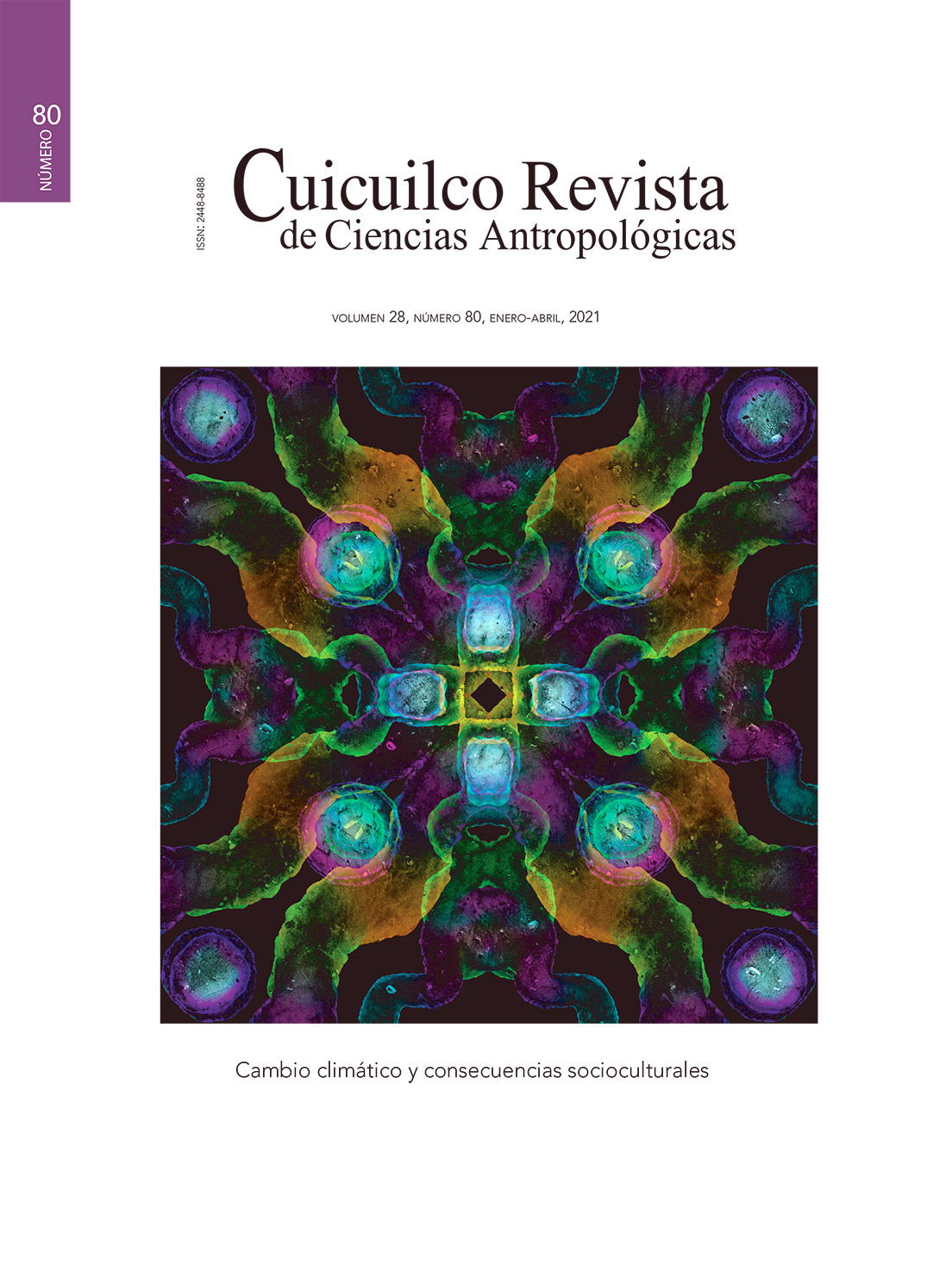Publicado 2021-06-20 — Actualizado el 2022-02-13
Versiones
- 2022-02-13 (4)
- 2022-02-13 (3)
- 2021-06-21 (2)
- 2021-06-20 (1)
Palabras clave
- Cuidado, representaciones sociales, cuidadores, personas mayores postradas, enfermedades crónicas.
Cómo citar
Resumen
Debido a los cambios epidemiológicos, demográficos, socioeconómicos y culturales en la población mexicana, existe un número creciente de personas que asumen el papel de cuidadores de otros; quienes atienden a personas mayores postradas comparten diversas representaciones sociales del cuidado durante las largas trayectorias de los padecimientos crónicos en las personas a las que asisten. Para analizar este proceso utilizamos la perspectiva de la antropología médica crítica, que ha desarrollado el estudio de las representaciones sociales para comprender los discursos sociales y la interiorización de éstos por parte de los actores del proceso salud-enfermedad-atención. El objetivo del presente trabajo es describir las representaciones sociales que los cuidadores construyen al atender las necesidades de las personas mayores postradas. Para ello, se realizó un estudio etnográfico donde participaron 11 cuidadores informales radicados en la Ciudad de México. Los resultados muestran que los cuidadores informales construyen sus representaciones sociales del cuidado a partir de sus interrelaciones con las redes de apoyo familiar/vecinal. Existen representaciones sobre la designación del cuidador, las motivaciones del cuidado y los roles del cuidado donde tienen un papel fundamental el género, la generación y los valores involucrados así como las condiciones socioeconómicas en que viven. Se concluye en la importancia de los aspectos socioculturales y la complejidad de las representaciones sociales del cuidado de las personas mayores postradas.
Descargas
Referencias
- Badinter, Elisabeth. 1980, ¿Existe el amor maternal? Historia del amor maternal. Siglos XVII al XX. Ediciones Paidós Ibérica. Barcelona.
- Batthyány, Karina. 2007, Género y cuidados familiares. ¿Quién se hace cargo del cuidado y la atención de los adultos mayores en Montevideo? Facultad de Ciencias Sociales, Departamento de Sociología-UNFPA. Uruguay.
- Connell, Robert. 1995, Masculinities. University of California Press. Berkeley.
- Darré, Silvana. 2013, Maternidad y tecnologías de género. Katz. Buenos Aires.
- D’Argemir, Cendra. 2016, Hombres cuidadores: barreras de género y modelos emergentes. Psicoperspectivas, 15 (3): 10-22.
- Federeci, Silvia. 2015, Sobre el trabajo de cuidado de los mayores y los límites del marxismo. Nueva Sociedad, (256), marzo-abril: 45-62.
- Frenk, Julio. 2003, La salud de la población. Hacia una nueva salud pública. Fondo de Cultura Económica. México.
- Guzmán, Guadalupe. 2015, Cuidados cotidianos, diabetes e hipertensión en embarazos. Una reflexión en clave antropológica, en Redes de cuidado, autocuidado y desigualdad en salud: personas que viven con enfermedades de larga duración, Ana Domínguez, Patricia Schwarz (coord.). Instituto de Investigaciones Gino Germani, Universidad de Buenos Aires. Buenos Aires: 62-72.
- Jodelet, Denise. 1986, La representación social: fenómenos, conceptos y teoría, en Psicología Social II: Pensamiento y vida social, Sergio Moscovici (ed.). Paidós. Barcelona: 469-494.
- Kohli Martin y Harald Kúnemund. 2003, Intergenerational Transfers in the Family: What Motivates Giving?, en Global Aging and Challenges to Families, Vern L. Bengtson, Ariela Lowenstein (ed.). Aldine de Gruyter. Nueva York: 123-142.
- Lozano, María. 2001, La Construcción del Imaginario de la Maternidad en Occidente. Manifestaciones del imaginario sobre la maternidad en los discursos sobre las Nuevas Tecnologías de Reproducción, tesis doctoral. Facultad de Ciencias de la Comunicación. Universidad Autónoma de Barcelona. Barcelona.
- Menéndez, Eduardo. 2003, Modelos de atención de los padecimientos: de exclusiones teóricas y articulaciones prácticas. Ciênc. saúde coletiva, 8 (1): 185-207.
- Messeri, Peter, Merrill Silverstein y Eugene Litwak. 1993, Choosing optimal support groups: A review and reformulation. Journal of Health and Social Behavior, 34 (2): 122-137.
- Núñez, Guillermo. 2016, Los estudios de género de los hombres y las masculinidades: ¿qué son y qué estudian? Culturales, época II, VI (1): 9-31.
- Oddone, María Julieta. 2014, Ancianas cuidadoras, redes y estrategias en el uso de programas sociales. Cuadernos de Pesquisa, 44 (152): 354-377.
- Osorio, Rosa María. 2001, Entender y atender la enfermedad. Los saberes maternos frente a los padecimientos infantiles. INI-INAH-CIESAS. México.
- Palomar, Cristina. 2005, El orden discursivo de género en Los Altos de Jalisco. Universidad de Guadalajara. Guadalajara.
- Robles, Leticia. 2007, La invisibilidad del cuidado a los enfermos crónicos. Un estudio cualitativo en el barrio de Oblatos. Universidad de Guadalajara. Guadalajara.
- Robles, Leticia y María Daniela Rosas. 2014, Herencia y cuidado: transiciones en la obligación filial. Desacatos, 45: 99-112.
- Rossi, Alice y Peter Henry Rossi. 1990, Social institutions and social change. Of human bonding: Parent-child relations across the life course. Aldine de Gruyter. Nueva York.
- Torres Javier. 2008, Aspectos psicológicos en cuidadores formales de ancianos: carga y afrontamiento del estrés (un estudio en población sociosanitaria), tesis de doctorado. Universidad de Huelva. Huelva.

